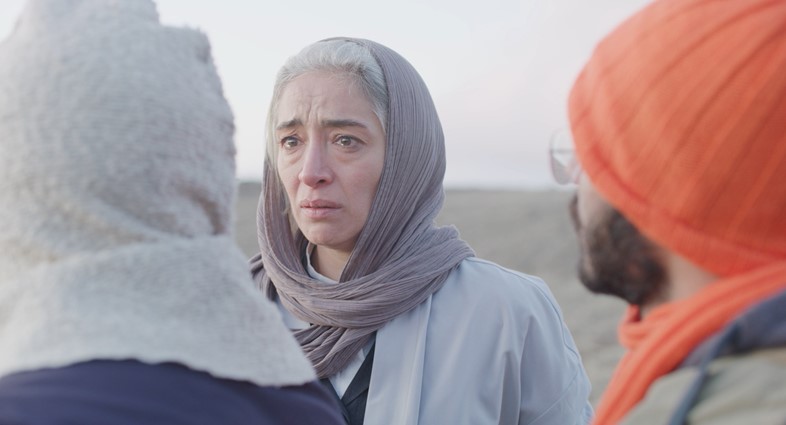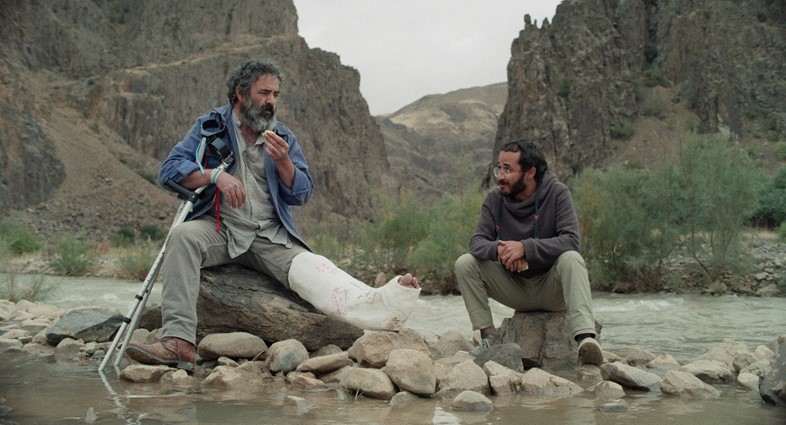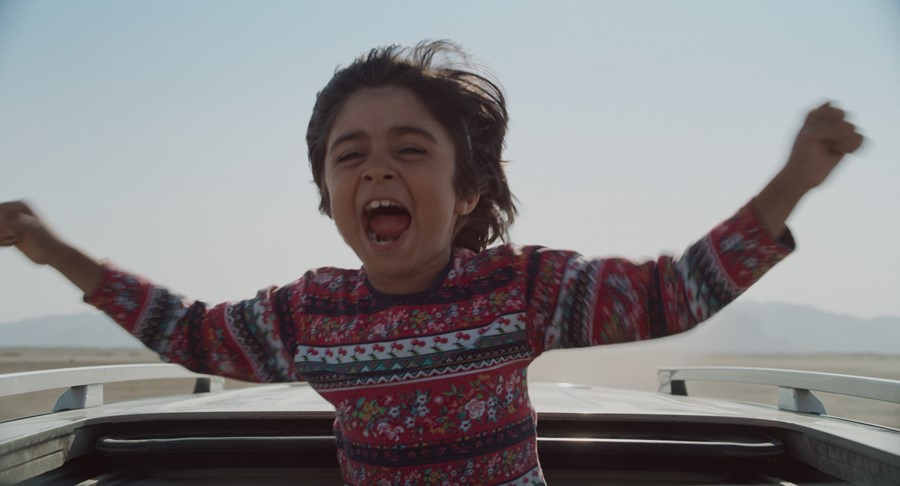As his debut feature is released, the Iranian director talks about escaping his father’s shadow, censorship in Iran, and the universal message behind the film
Panah Panahi’s debut feature isn’t a typical Iranian film. Whereas the Iran-shot movies of Abbas Kiarostami, Asghar Farhadi, and Panah Panahi’s father, Jafar Panahi, tend to be restrained and minimalist, Hit the Road deviates from reality and bursts with Iranian pop music: a six-year-old boy breaks the fourth wall and lip-syncs to camera; a mother sings along with pre-revolution tunes to disguise her sadness; and in the bleakest moment, the camera soars towards the sky for a transcendent, hypnotic homage to 2001: A Space Odyssey.
A sly, slippery drama that’s heavy on political fury and also hilarity, Hit the Road introduces a family on a fraught car journey. For a lengthy period, the purpose behind the drive through Iran’s dusty landscape is kept hidden – and if you don’t want to know, stop reading here. The fidgety mother (Pantea Panahiha) is on edge, the cranky father (Hasan Majuni) nurses a broken leg, the elder son (Amin Simiar) is quietly consumed with emotion, and the youngest son (Rayan Sarlak, a comic superstar in the making) fills the silence with incessant chatter. The parents, it’s revealed, have sold their home in order to smuggle their 20-year-old child across the border to Turkey.
“I had a couple of friends who left Iran illegally,” Panah, 38, informs me from Tehran via an interpreter in late June. “Their last journey to the border was done with their families. I found their stories to be so cinematic.” Do a lot of Iranian youth wish to leave? “Trying to have a better life now in Iran is hopeless. The only way you can project yourself in that better life is to consider leaving the country. That’s almost factual. Not everybody does it, but everybody wishes to do it.”

Not that Hit the Road is as depressing as its subject matter. The first half weaves in comic vignettes such as a hitchhiking cyclist who’s cheating in a race and an annoying dog that nobody wishes to abandon. Inside the SUV, too, the family dynamic unfolds like a finely tuned sitcom pilot, although it gradually reveals a more sinister reality: the older son’s slumping body language is apologetic, the mother frets that they’re being followed, and a mobile phone is buried in the dirt. Meanwhile, the oblivious younger boy’s unfiltered yapping only highlights the absurdity of the cruel scenario.
“What I found more interesting than factually presenting contemporary Iran, is this journey of a family letting their child go,” Panah explains. “They’re sending their child to the unknown. Maybe death. But still, you let your child leave. That’s probably what allowed audiences of the world to relate to this film. It’s not about one group of people who have one specific problem in one point of the world; it’s something more common to our existence as human beings.”
While Panah doesn’t consider Hit the Road to be strictly autobiographical, his sister, Solmaz Panahi, moved to Paris, legally, due to the scrutiny over their father. Hit the Road, too, doubles as a metaphor for smuggling a movie out of Iran. For instance, the script submitted to receive a permit for shooting in Iran had the older son eventually deciding to stay in the country – safe to say, that’s not the screenplay which was actually used.

Moreover, Panah is the son of a celebrated auteur who, in 2010, received a 20-year ban from filmmaking by the Iranian government for supposed propaganda; since then, Jafar Panahi has released four films, including This Is Not a Film, which was posted to Cannes on a USB stick hidden in a birthday cake, and 3 Faces, on which Panah was an editor. (Our Zoom call is a few weeks before the arrest of Jafar Panahi by the Iranian government for enquiring about the detention of fellow filmmakers Mohammad Rasoulof and Mostafa Al-Ahmad. At the time of writing, Jafar is facing six years’ imprisonment; his wife told the BBC it’s a “kidnapping”.)
In keeping with the family tradition, Hit the Road premiered at last year’s Cannes where it was a critical hit and proved that the first-time filmmaker has already escaped his father’s shadow. In Iran, though, Panah’s tragicomedy never received a theatrical release. “It’s been shown on two Iranian platforms, so some people did see it,” the director clarifies. “But there’s a boycott of the film in magazines and on websites. It’s as if it didn’t exist.”
What’s the verdict from the few Iranians who caught the film? “In general, the most negative reviews I’ve gotten come from Iranians. They find the film too long or the script uninteresting. But I think that’s because Iran is extremely conservative. We’re isolated and locked into a certain way of being – and also in terms of cinema. Iranian cinema isn’t ready for anything a bit whimsical or postmodern.”
Then again, Iranian movies – at least the ones that reach UK cinemas – often revolve around cars. After all, during his house arrest and filmmaking ban, Jafar drove around with a camera in Taxi and 3 Faces; the most famous works by Kiarostami involve lengthy driving scenes. In Hit the Road, the family vehicle is essentially a location of its own. “I wanted the car to feel claustrophobic,” Panah explains. “I played with lenses to contrast it with the wide angles and spaces of the second half of the film.”
When the family step out of the car, danger permeates the open air. Panah further toys with the geographical shift by inserting a Kubrick homage: “It’s through 2001 [that] I discovered sci-fi and got passionate not only about literature and cinema, but also looking up at the sky, the stars, and the galaxy. That film opened a whole world for me.” He adds, “I have a sci-fi project but it won’t be my second or third film … in Iran, it would be impossible. I couldn’t even choose the size of the car because of the little means we have in the Iranian industry.”
When I remark that Iran and its endless landscapes – the deserts and fields of Hit the Road could be reused for a modern remake of Tarkovsky’s Stalker – seem particularly cinematic, Panah counters that westerners only watch a fraction of his country’s output. “98 per cent of Iranian films deal with the struggles of the city, the tensions, the difficulties. Maybe the only director you know abroad whose representative of this trend is Farhadi.”
The problem with Iranian films set in the city, Panah continues, is that any scene set inside a house is false. Iranian law dictates that a woman’s hair can’t be shown on screen, and thus female characters will wear a hijab in the privacy of their bedroom. “Women don’t wear a scarf at home,” he says. “But we have to accept this artificial rule in our films. And if we don’t want to make a film that’s telling a lie about female characters? We have no other choice than taking a car and hitting the road.”
Hit the Road is exclusively in UK cinemas on July 29.
